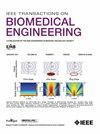A Wireless Miniature Injectable Device With Memory-Assisted Backscatter for Multimodal Animal Physiological Monitoring
IF 4.4
2区 医学
Q2 ENGINEERING, BIOMEDICAL
引用次数: 0
Abstract
This paper introduces a wirelessly powered multimodal animal physiological monitoring application-specific integrated circuit (ASIC). Fabricated in the 180 nm process, the ASIC can be integrated into an injectable device to monitor subcutaneous body temperature, electrocardiography (ECG), and photoplethysmography (PPG). To minimize the device size, the ASIC employs a miniature receiver (Rx) coil for wireless power receiving and data communication through a single inductive link operating at 13.56 MHz. We propose a folded L-shape Rx coil with improved coupling to the transmitter (Tx) coil, even in the presence of misalignment, and enhanced quality factor. The ASIC functions alternatively between recording and sleeping modes, consuming 2.55 µW on average. For PPG measurements, a reflection-type PPG sensor illuminates an LED with tunable current pulses. A current-input analog frontend (AFE) amplifies the current of a photodiode (PD) with 30.8 pARMS current input-referred noise (IRN). The ECG AFE captures ECG signals with a configurable gain of 45-80 dB. The temperature AFE achieves 0.02 °C inaccuracy within a sensing range between 27-47 °C. The AFE outputs are sequentially digitized by a 10-bit successive approximation register (SAR) analog-to-digital converter (ADC) with an effective number of bits (ENOB) of 8.79. To improve the reliability of data transmission, we propose a memory-assisted backscatter scheme that stores ADC data in an off-chip memory and transmits it when the coupling condition is stable. This scheme achieves a package loss rate (PLR) lower than 0.2% while allowing 24-hour data storage. The device's functionality has been evaluated by in vivo experiments.用于多模式动物生理监测的具有记忆辅助反向散射功能的无线微型注射设备。
本文介绍了一种无线供电的多模式动物生理监测专用集成电路(ASIC)。该专用集成电路采用 180 纳米工艺制造,可集成到注射装置中,用于监测皮下体温、心电图和光电血压计。为了尽量减小设备尺寸,ASIC 采用了微型接收器(Rx)线圈,通过 13.56 MHz 工作频率的单一感应链路进行无线功率接收和数据通信。我们提出的折叠式 L 形接收器线圈改善了与发射器(Tx)线圈的耦合,即使在不对准的情况下也是如此,并提高了品质因数。ASIC 可在记录模式和睡眠模式之间交替工作,平均耗电量为 2.55 μW。对于 PPG 测量,反射型 PPG 传感器用可调电流脉冲照亮 LED。电流输入模拟前端(AFE)放大光电二极管(PD)的电流,电流输入参考噪声(IRN)为 30.8 pARMS。心电图 AFE 可捕捉心电图信号,可配置增益为 45-80 dB。温度 AFE 在 27-47 ̊C 的感应范围内可达到 0.02 ̊C 的误差。AFE 的输出由一个 10 位逐次逼近寄存器 (SAR) 模数转换器 (ADC) 依次数字化,有效位数 (ENOB) 为 8.79。为了提高数据传输的可靠性,我们提出了一种存储器辅助反向散射方案,将 ADC 数据存储在片外存储器中,并在耦合条件稳定时进行传输。该方案实现了低于 0.2% 的封装损耗率 (PLR),同时允许 24 小时数据存储。该器件的功能已通过体内实验进行了评估。
本文章由计算机程序翻译,如有差异,请以英文原文为准。
求助全文
约1分钟内获得全文
求助全文
来源期刊

IEEE Transactions on Biomedical Engineering
工程技术-工程:生物医学
CiteScore
9.40
自引率
4.30%
发文量
880
审稿时长
2.5 months
期刊介绍:
IEEE Transactions on Biomedical Engineering contains basic and applied papers dealing with biomedical engineering. Papers range from engineering development in methods and techniques with biomedical applications to experimental and clinical investigations with engineering contributions.
 求助内容:
求助内容: 应助结果提醒方式:
应助结果提醒方式:


